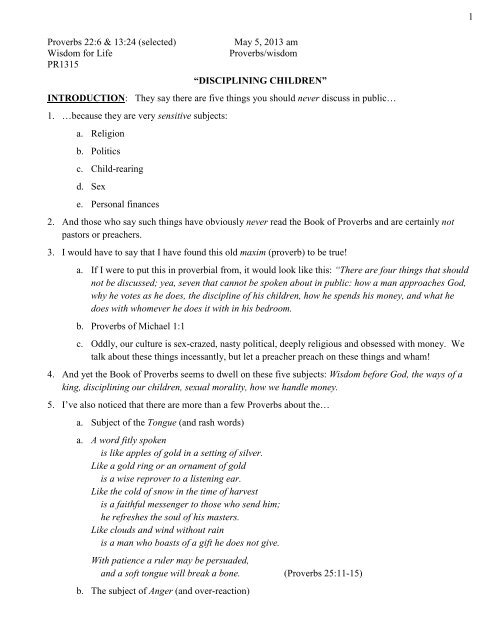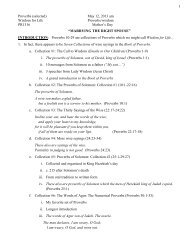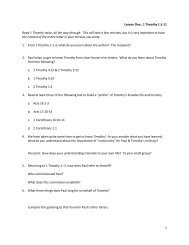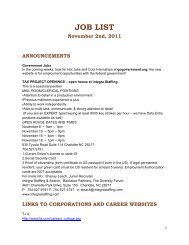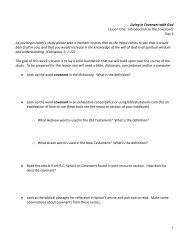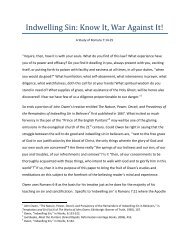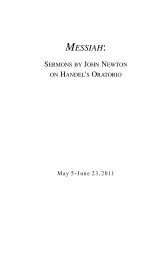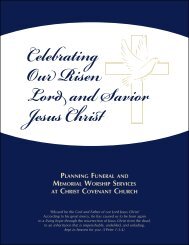Long sermon outline - Christ Covenant Church
Long sermon outline - Christ Covenant Church
Long sermon outline - Christ Covenant Church
You also want an ePaper? Increase the reach of your titles
YUMPU automatically turns print PDFs into web optimized ePapers that Google loves.
Proverbs 22:6 & 13:24 (selected)<br />
Wisdom for Life<br />
PR1315<br />
May 5, 2013 am<br />
Proverbs/wisdom<br />
“DISCIPLINING CHILDREN”<br />
INTRODUCTION: They say there are five things you should never discuss in public…<br />
1. …because they are very sensitive subjects:<br />
a. Religion<br />
b. Politics<br />
c. Child-rearing<br />
d. Sex<br />
e. Personal finances<br />
2. And those who say such things have obviously never read the Book of Proverbs and are certainly not<br />
pastors or preachers.<br />
3. I would have to say that I have found this old maxim (proverb) to be true!<br />
a. If I were to put this in proverbial from, it would look like this: “There are four things that should<br />
not be discussed; yea, seven that cannot be spoken about in public: how a man approaches God,<br />
why he votes as he does, the discipline of his children, how he spends his money, and what he<br />
does with whomever he does it with in his bedroom.<br />
b. Proverbs of Michael 1:1<br />
c. Oddly, our culture is sex-crazed, nasty political, deeply religious and obsessed with money. We<br />
talk about these things incessantly, but let a preacher preach on these things and wham!<br />
4. And yet the Book of Proverbs seems to dwell on these five subjects: Wisdom before God, the ways of a<br />
king, disciplining our children, sexual morality, how we handle money.<br />
5. I’ve also noticed that there are more than a few Proverbs about the…<br />
a. Subject of the Tongue (and rash words)<br />
a. A word fitly spoken<br />
is like apples of gold in a setting of silver.<br />
Like a gold ring or an ornament of gold<br />
is a wise reprover to a listening ear.<br />
Like the cold of snow in the time of harvest<br />
is a faithful messenger to those who send him;<br />
he refreshes the soul of his masters.<br />
Like clouds and wind without rain<br />
is a man who boasts of a gift he does not give.<br />
With patience a ruler may be persuaded,<br />
and a soft tongue will break a bone. (Proverbs 25:11-15)<br />
b. The subject of Anger (and over-reaction)<br />
1
2<br />
A soft answer turns away wrath,<br />
but a harsh word stirs up anger. (Proverbs 15:1)<br />
Good sense makes one slow to anger,<br />
and it is his glory to overlook an offense. (Proverbs 19:11)<br />
A man of wrath stirs up strife,<br />
and one given to anger causes much transgression.<br />
One's pride will bring him low,<br />
but he who is lowly in spirit will obtain honor. (Proverbs 29:22-23)<br />
c. James brings these two warnings about speech and anger together in this wise exhortation…<br />
Know this, my beloved brothers: let every person be quick to hear, slow to speak, slow to anger;<br />
for the anger of man does not produce the righteousness of God. Therefore put away all filthiness<br />
and rampant wickedness and receive with meekness the implanted word, which is able to save<br />
your souls. (James 1:19-21)<br />
6. In preaching, I will not always get things right.<br />
a. I preach an inerrant Word in an errant manner.<br />
All Scripture is breathed out by God and profitable for teaching, for reproof, for correction, and<br />
for training in righteousness, that the man of God may be complete, equipped for every good<br />
work. (2 Timothy 3:16-17)<br />
For we are the aroma of <strong>Christ</strong> to God among those who are being saved and among those who<br />
are perishing, to one a fragrance from death to death, to the other a fragrance from life to life.<br />
Who is sufficient for these things? For we are not, like so many, peddlers of God's word, but as<br />
men of sincerity, as commissioned by God, in the sight of God we speak in <strong>Christ</strong>. (2 Corinthians<br />
2:15-17)<br />
b. Preaching the Word is a challenge: The risky part is always the applications; applying the text<br />
and the truth.<br />
c. When I first came here, I preached through Philippians and made very few applications: “He’s<br />
too academic”<br />
d. Now, 7 years later, I’m preaching through Proverbs and my applications are “too pointed,” “too<br />
graphic,” etc.<br />
e. Example: 4 weeks ago in reference to teen models.<br />
7. I have a lot of things on my mind and on my plate –<br />
a. Our church is being sued<br />
b. Answering a complaint against our Presbytery<br />
c. 40 th Moderator of the PCA – trying bridge between factions<br />
d. Boy Scout Troop and homosexual members<br />
e. Obama’s Health Care Law and its impact on our church policy<br />
f. City of Matthews and neighbors upset with CDS and SOAR (fields)
3<br />
g. Unemployment of many of our members<br />
h. Board of <strong>Covenant</strong> College: New President, New Transitions<br />
i. <strong>Church</strong> discipline cases<br />
j. Consulting with troubled churches in the PCA<br />
k. The deep, challenging issues college kids are facing (CO)<br />
l. Same-sex marriage and its ramifications<br />
m. Numbers of people with serious or terminal illnesses<br />
n. Too many troubled marriages<br />
o. Family members in prison or in transition<br />
p. Financial stresses of several of our families (budget)<br />
q. The gender issues facing our young men and women<br />
r. Radio program and the responses of the general public<br />
s. Private letters, notes and contacts of personal nature (tragedy)<br />
t. Security of our youth and children on this campus (CCC & CDS)<br />
u. Contacts I have with CDS kids, parents, and faculty<br />
v. Helping people make peace and reconcile<br />
w. But…the main thing that burdens me is this…<br />
8. YOUR CHILDREN! Not that your children are a problem or a pain, quite the opposite!<br />
9. When I look out at the congregation every Sunday morning, I am always so touched by the young faces I<br />
see.<br />
a. Some say that our church is aging; not so!<br />
b. Our last 4-5 Discovery Classes have been full of young couples, students, high school and junior<br />
high kids, and babies in Mother’s laps.<br />
c. I look out today and see, sitting in “tribes” – CO kids, the High School Group, little children of<br />
our young families…<br />
d. To say nothing of Generation Next back in the nurseries<br />
10. And I am burdened for these children – your kids and my grandkids, and the world and church we will<br />
leave to them.<br />
11. For this one, main reason, I chose to preach through Proverbs this 2013 year.<br />
a. Wisdom for Generations in Community<br />
b. O God, from my youth you have taught me,<br />
and I still proclaim your wondrous deeds.<br />
So even to old age and gray hairs,<br />
O God, do not forsake me,
4<br />
until I proclaim your might to another generation,<br />
your power to all those to come. (Ps. 71:17-18)<br />
c. Help for you in preparing your children for the future…<br />
d. And protecting them from spiritual, moral and cultural dangers<br />
12. We’ve finished Solomon’s 10 “emails to our children” and Lady Wisdom’s (<strong>Christ</strong>’s) 3 “Discourses on<br />
Wisdom”<br />
13. Now we enter the heart of Proverbs: chapters 10-29.<br />
a. Wisdom for Life<br />
b. Fifteen messages on various topics in Proverbs<br />
c. Finances, marriage, friends and friendship, work and poverty, helping the elderly, blessing your<br />
parents, etc.<br />
d. And today: Disciplining Your Children<br />
14. Yep! It’s one of those five subjects we’re not supposed to talk about in public, so…<br />
a. Let’s make a deal…<br />
b. I will be very tactful and gracious in my applications<br />
c. If you will promise not to get angry, and let the Word do its work in you<br />
d. Know this, my beloved brothers: let every person be quick to hear, slow to speak, slow to anger;<br />
for the anger of man does not produce the righteousness of God. Therefore put away all filthiness<br />
and rampant wickedness and receive with meekness the implanted word, which is able to save<br />
your souls.<br />
But be doers of the word, and not hearers only, deceiving yourselves. For if anyone is a hearer of<br />
the word and not a doer, he is like a man who looks intently at his natural face in a mirror. For<br />
he looks at himself and goes away and at once forgets what he was like. But the one who looks<br />
into the perfect law, the law of liberty, and perseveres, being no hearer who forgets but a doer<br />
who acts, he will be blessed in his doing. (James 1:19-25)<br />
15. There are nine Proverbs I’d like to look at this morning:<br />
Whoever spares the rod hates his son,<br />
but he who loves him is diligent to discipline him. (Proverbs 13:24)<br />
A rebuke goes deeper into a man of understanding<br />
than a hundred blows into a fool. (Proverbs 17:10)<br />
Discipline your son, for there is hope;<br />
do not set your heart on putting him to death. (Proverbs 19:18)<br />
Blows that wound cleanse away evil;<br />
strokes make clean the innermost parts. (Proverbs 20:30)<br />
Train up a child in the way he should go;<br />
even when he is old he will not depart from it. (Proverbs 22:6)
5<br />
Folly is bound up in the heart of a child,<br />
but the rod of discipline drives it far from him. (Proverbs 22:15)<br />
Do not withhold discipline from a child;<br />
if you strike him with a rod, he will not die.<br />
If you strike him with the rod,<br />
you will save his soul from Sheol. (Proverbs 23:13-14)<br />
The rod and reproof give wisdom,<br />
but a child left to himself brings shame to his mother. (Proverbs 29:15)<br />
Discipline your son, and he will give you rest;<br />
he will give delight to your heart. (Proverbs 29:17)<br />
16. Disciplining Your Children is really, according to Solomon, a three-phase process over a lifetime –<br />
a. The Rod (Proverbs 13:24; 20:30; 22:15; 23:13-14 and 29:15)<br />
b. The Regimen (Proverbs 22:6)<br />
c. The Rebuke (Proverbs 17:10; 19:18 and 29:17)<br />
I. THE ROD: WHEN TO SPANK YOUR CHILDREN (Proverbs 13:24; 20:30; 22:15; 23:13-14 and 29:15)<br />
1. Let me begin my laying out the context of discipline.<br />
a. Discipline and discipleship come from the same root word and are facets of the same process.<br />
b. Merriam-Webster.com defines discipline in 6 ways<br />
i. Punishment<br />
ii. Obsolete: instruction<br />
iii. A field of study (e.g., the discipline of math)<br />
iv. A training that corrects, molds, perfects the mental faculties or moral character<br />
v. A rule or system of rules governing conduct or activity<br />
vi. A control gained by enforcing obedience or order; orderly or prescribed conduct or<br />
patterns of behavior; self-control<br />
c. From the Latin disciplina (teaching) or discipulus (pupil)<br />
d. The point: 99% of discipline is positive: <strong>sermon</strong>s, school work, rules at home, verbal<br />
instruction, good habits, etc.<br />
e. Example: You are being disciplined right now, in a positive way, as “discipleship,” being<br />
trained by the Word.<br />
f. Go therefore and make disciples of all nations, baptizing them in the name of the Father and<br />
of the Son and of the Holy Spirit, teaching them to observe all that I have commanded you.<br />
And behold, I am with you always, to the end of the age.” (Matthew 28:19-20)
6<br />
2. But there are times when negative discipline is necessary.<br />
a. And so Solomon talks about “the rod” (spanking) several times.<br />
b. Whoever spares the rod hates his son,<br />
but he who loves him is diligent to discipline him. (Proverbs 13:24)<br />
c. Blows that wound cleanse away evil;<br />
strokes make clean the innermost parts. (Proverbs 20:30)<br />
d. Folly is bound up in the heart of a child,<br />
but the rod of discipline drives it far from him. (Proverbs 22:15)<br />
e. Do not withhold discipline from a child;<br />
if you strike him with a rod, he will not die.<br />
If you strike him with the rod,<br />
you will save his soul from Sheol. (Proverbs 23:13-14)<br />
f. The rod and reproof give wisdom,<br />
but a child left to himself brings shame to his mother. (Proverbs 29:15)<br />
3. For centuries, even millennia, parents around the world have “spanked” their little ones.<br />
a. I myself have witnessed this in England, Scotland, Peru, Malawi, South Africa, India,<br />
Hungary, Romania, Italy, Germany, and Australia.<br />
b. Russian Proverb: “Love your children with your heart, but train them with your hands.”<br />
c. “Rods” are used in every culture and in every land.<br />
d. Hence, the English Proverb: “spare the rod, spoil the child.” (cf. Psalm 13:24)<br />
4. Does Solomon mean a rod of corporal punishment? Spankings? Yes, he does.<br />
a. This is the clear and consistent meaning of the “rod” in the 5 Proverbs we mentioned here.<br />
b. Robert L. Alden: A Commentary on an Ancient Book of Timeless Advice; p. 109.<br />
The Bible definitely recommends physical discipline of children. Spanking, for instance, is<br />
proof of a parent’s love for his child in the sense that he cares enough for the child to<br />
discipline him. It is far better for a parent to be accused of corporal punishment than to be<br />
accused of ignoring or not caring enough about his children. The “rod” in this verse is not<br />
merely a figure of speech; but the combined weight of parallel passages in Proverbs supports<br />
is literal meaning.<br />
c. The parallel proverbs speak of stripes, beating, strokes, etc., proof of a “spanking stick”<br />
5. The key word in this chapter is the Hebrew word musar: instruction or discipline. It occurs 3 times.<br />
a. A wise son hears his father's instruction,<br />
but a scoffer does not listen to rebuke. (Proverbs 13:1)<br />
Poverty and disgrace come to him who ignores instruction,<br />
but whoever heeds reproof is honored. (Proverbs 13:18)<br />
Whoever spares the rod hates his son,<br />
but he who loves him is diligent to discipline him. (Proverbs 13:24)
7<br />
b. In this chapter, and throughout Proverbs, instruction is paired with discipline.<br />
c. Key proverbial connection: A wise son: a father’s discipline<br />
d. <strong>Long</strong>ings fulfilled, riches and virtue, a godly heritage are all tied to discipline in this chapter.<br />
e. In other words: Helping our children experience a rich spiritual life involves discipline; and<br />
a part of discipline is the “rod.”<br />
6. Bruce K. Waltke gives the full sense of Proverbs 13:24; and other Proverbs about the “rod.”<br />
(Proverbs: NICOT; p. 574).<br />
a. The one who holds back his rod of remedial punishment is one who hates his son. But the one<br />
who loves him in spite of the difficulties involved, seeks him diligently with discipline.<br />
b. “rod” is the Hebrew word shebet: rod, stick, club, staff, scepter<br />
c. Bruce Waltke (p. 574)<br />
Loving parents seek to correct the faults of their children because, as the preceding unit<br />
showed, their children’s lives, favor, protection, healing dignity, and prosperity are at stake.<br />
Unloving parents turn their backs on them and hand them over to death, social ruin, public<br />
exposure, calamity, and shameful poverty. The proverb is based on several assumptions.<br />
First, that the home is the basic social unit for transmitting values. Second, that parents have<br />
absolute values, not merely valuations. Third, that folly is bound up in the heart of the child.<br />
Fourth, “that it will take more than just words to dislodge it.” The biblical method of rearing<br />
is loving the child, which entails strict discipline and valuing him or her as a gift from God.<br />
The New Testament teaching does not abrogate or supersede it and should not be abandoned<br />
in the church as unfashionable or explained away as culturally conditioned.<br />
7. Tremper <strong>Long</strong>man agrees that these Proverbs on the “rod” point to physical discipline (Baker<br />
Commentary on the Old Testament Wisdom and Psalms: Proverbs; p. 292.)<br />
In this case, since the rod is mentioned, the discipline in mind here is physical. One should not think<br />
of severe beatings, however: As the sages’ words were kind and merciful, so were the blows they<br />
administered. In this day of appropriate concern for destructive and hateful physical abuse of<br />
children, there is an understandable hesitation about proverbs like this one that advocate physical<br />
discipline. Nonetheless, as is typical in such instances, there has been an equally harmful<br />
countertendency to refrain from any kind of verbal or physical correction to behavior, which is<br />
arguably not helping children either. Clifford, in my opinion, is quite unreasonable to state, “It goes<br />
without saying that this paradoxical language cannot be used as an argument for the corporal<br />
punishment of children.” It would be more reasonable to add the modifier “harsh” or “excessive”<br />
before corporal. It was not only the wise of Israel who encouraged physical discipline to inculcate<br />
wise behavior, but the rest of the ancient Near East as well.<br />
8. When commentators like Paul E. Koptak write, “This verse can never be taken as support for<br />
corporal punishment.” (p. 362), he speaks more from modern culture than from God’s Word. And, I<br />
am afraid to say, he is wrong.<br />
9. Dr. Benjamin M. Spock’s book The Common Sense Book of Baby and Child Care, published in<br />
1946, changed the way American’s reared their children.<br />
a. Co-written with his wife, Jane Cheney Spock, an ACLU advocate
8<br />
b. They divorced in 1976.<br />
c. Their permissive, non-spanking precepts led to a generation of troubled children – their own<br />
included.<br />
d. Sadly, it became “the bible” on child-rearing for Post War America!<br />
10. I.D.E. Thomas: A Word from the Wise; p. 77.<br />
a. It is no wonder that Dr. Spock’s book Baby and Child Care achieved great popularity,<br />
exceeding the 28 million mark in sales. Dr. Spock convinced a whole generation of fathers<br />
and mothers that permissiveness was the right policy. Children were merely passing through<br />
phases and in time would outgrow their tantrums. As a result discipline became a dirty word<br />
and corporal punishment was out. Yes, it is much easier to spare the rod.<br />
b. Actually, the sales are now over 50 million in 49 different languages.<br />
c. And spanking is now outlawed in 24 countries according to UPI (others tabulate the total as<br />
32 countries)<br />
d. I.D.E. Thomas: pp. 77-78.<br />
And so the experiment has been tried. For years now Dr. Spock’s principles have been put<br />
into practice, with fathers and mothers throwing away the birch, the paddle, and the cane.<br />
They sat back in comfort as their children grew up according to the new rules, or lack of<br />
rules. What has been the result of all this? Nothing but a generation of rowdy and rebellious<br />
youth, defying authority, irritating their elders, and insulting their parents.<br />
11. It is important to see all that Solomon says about “spanking” – the “rod” in its full context –<br />
a. First: it is the Fathers’/Mothers’ rod; no one else’s<br />
b. Second: it is used for a child – a little one and not an adolescent or youth<br />
c. Third: it is used as a last resort and in cases of extreme importance: “to save his life”<br />
d. Fourth: it is intended for little ones who cannot yet understand reason, reproof, correction or<br />
instruction<br />
12. Will it hurt? Yes! Will it harm? Not if done correctly!<br />
a. It must be done with godly love.<br />
For the Lord disciplines the one he loves,<br />
and chastises every son whom he receives. (Hebrews 12:6)<br />
b. It must be done with tenderness and restraint –<br />
Fathers, do not provoke your children to anger, but bring them up in the discipline and<br />
instruction of the Lord. (Ephesians 6:4)<br />
c. It must not be done to such excess that discourages the child –<br />
Fathers, do not provoke your children, lest they become discouraged. (Colossians 3:21)<br />
d. We should always remember that they are little children…<br />
e. …but nonetheless full of folly and sin!
9<br />
Folly is bound up in the heart of a child,<br />
but the rod of discipline drives it far from him. (Proverbs 22:15)<br />
Do not withhold discipline from a child;<br />
if you strike him with a rod, he will not die.<br />
If you strike him with the rod,<br />
you will save his soul from Sheol. (Proverbs 23:13-14)<br />
f. English Proverb: “Better a child weep than an old man.”<br />
13. Jane and I spanked our children very little and frankly very mildly. But we used the rod when they<br />
were in the early years of discipleship. Soon our children outgrew the rod.<br />
14. The “rod” is only a tiny part of a life-long process of discipleship…<br />
II. THE REGIMEN: HOW TO TEACH YOUR CHILDREN (Proverbs 22:6)<br />
Train up a child in the way he should go;<br />
even when he is old he will not depart from it. (Proverbs 22:6)<br />
1. Here Solomon turns to “positive” discipline; he calls it “training.”<br />
a. His synonyms for the training are many: reproof, instruction, discipline, correction,<br />
righteousness, etc.<br />
b. A wise son hears his father's instruction,<br />
but a scoffer does not listen to rebuke. (Proverbs 13:1)<br />
2. Solomon presents a very comprehensive picture of how discipline is to be positively communicated<br />
through training of our children.<br />
3. The regimen of training includes seven aspects of life<br />
a. A strong family as a cohesive spiritual unit is the “school of <strong>Christ</strong>” for any child.<br />
b. The family is the locus of instruction: the key place of discipleship (not the church).<br />
c. Children must respect their parents and receive their instruction, reproof, correction, and rules.<br />
d. Parents must love their children. Discipline only works if it is truly done in tenderness and<br />
love –even spanking!<br />
e. Parents must model what they tell their children to do.<br />
f. It takes a community of wise people – parents, grandparents, pastors, teachers, magistrates –<br />
to raise up godly, wise children. Partnership in parenting is essential.<br />
g. The goal: to shape them into <strong>Christ</strong>like people who love God and serve others<br />
4. Illustration: I watched ESPNU recently, as a young man declared his intent to play football at a<br />
specific college.<br />
a. When asked, “How’d you arrive at this state in your life?”
. He responded, humbly, and with a smile: “Well, it takes a village! My parents, coaches, and<br />
others have helped me all along the way.”<br />
c. And so they have: godly Mom and Dad, <strong>Christ</strong>ian coaches, pastors of churches, Bible-study<br />
leaders, parents of his teammates, <strong>Christ</strong>ian buddies, upper-classmen, and caring college<br />
coaches recruiting him.<br />
d. The training process led him to God’s choice for his college career. “The Village” helped<br />
him on his way.<br />
5. Consistency in <strong>Christ</strong>ian community is THE KEY to proper, balanced, Biblical and effective childrearing.<br />
6. Raising children in the ways of the Lord is not easy. In fact, it is the hardest thing you’ll ever<br />
attempt. The last thing it can be is simple.<br />
a. Why? Because the <strong>Christ</strong>ian religion is not simple.<br />
b. C. L. Lewis: Mere <strong>Christ</strong>ianity; pp. 40-41.<br />
It is not good asking for a simple religion. After all, real things are not simple. They look<br />
simple, but they are not. A child saying a child’s prayer looks simple. And if you are content<br />
to stop there, well and good. But if you are not—and the modern world usually is not—if you<br />
want to go on and ask what is really happening—then you must be prepared for something<br />
difficult. If we ask for something more than simplicity, it is silly then to complain that the<br />
something more is not simple. Very often, however, this silly procedure is adopted by people<br />
who are not silly, but who, consciously or unconsciously, want to destroy <strong>Christ</strong>ianity. Such<br />
people put up a version of <strong>Christ</strong>ianity suitable for a child of six and make that the object of<br />
their attack. When you try to explain the <strong>Christ</strong>ian doctrine as it is really held by an<br />
instructed adult, they they complain that you are making their heads turn round and that it is<br />
all too complicated and that if there really were a God they are sure He would have made<br />
‘religion’ simple, because simplicity is so beautiful, etc. You must be on your guard against<br />
these people for they will change their ground every minute and only waste your time notice,<br />
too, their idea of God ‘making religion simple’; as if ‘religion’ were something God invented,<br />
and not His statement to us of certain quite unaltered facts about His own nature. Besides<br />
being complicated, reality, in my experience, is usually odd. It is not neat, not obvious, not<br />
what you expect. Reality, in fact, is usually something you could not have guessed. That is<br />
one of the reasons I believe <strong>Christ</strong>ianity. It is a religion you could not have guessed.<br />
c. I have always avoided those simplistic books about marriage, family and child-rearing.<br />
• Wild at heart<br />
• Raising a young knight<br />
• 7 keys to godly kids<br />
7. Bringing up a child in the way God designs is a lifelong process, where success is only seen in the<br />
later years of the regiment –<br />
a. Train up a child in the way he should go;<br />
even when he is old he will not depart from it. (Proverbs 22:6)<br />
10
11<br />
b. Key: “…and when he is old…”<br />
c. Don’t give up too soon!<br />
III. THE REBUKE: WHEN TO CONFRONT YOUR CHILDREN (Proverbs 17:10; 19:18; 29:17)<br />
A rebuke goes deeper into a man of understanding<br />
than a hundred blows into a fool. (Proverbs 17:10)<br />
Discipline your son, for there is hope;<br />
do not set your heart on putting him to death. (Proverbs 19:18)<br />
Discipline your son, and he will give you rest;<br />
he will give delight to your heart. (Proverbs 29:17)<br />
1. The Proverbs tell us to correct, reprove, rebuke, discipline our children on a regular basis.<br />
2. And it appears to carry on from childhood into, and including, maturity (adulthood)<br />
a. A rebuke goes deeper into a man of understanding<br />
than a hundred blows into a fool. (Proverbs 17:10)<br />
b. Key: “a man of understanding”<br />
c. Who is certainly not a child, a teenager, or a college youth<br />
d. Adult children need correction and rebuke.<br />
3. There’s some common sense here: Rebuking a child is not as effective as rebuking an adult.<br />
a. i.e., you can’t reason with a child until her (she) matures to the point where reason prevails<br />
b. Until that time, you must use training (shaping) and spanking (determent).<br />
c. But also: Adult children are not above or beyond correction. When does a parent cease to be<br />
a parent? And when does a son or a daughter cease to be a child to their parents?<br />
d. Answer: Never<br />
4. Grandparents should speak words of discipleship (discipline) into their adult children’s lives for the<br />
sake of their grandchildren, if for the benefit of no one else.<br />
5. This idea that a son or a daughter grows up to a point where their parents have no say in their lives is<br />
simply a modern idea that is not biblical.<br />
6. The Fourth commandment carries us through life!<br />
a. Children, obey your parents in the Lord, for this is right. “Honor your father and mother”<br />
(this is the first commandment with a promise), “that it may go well with you and that you<br />
may live long in the land.” (Ephesians 6:1-3)<br />
b. Our theme verse for this year (2013)
12<br />
O God, from my youth you have taught me,<br />
and I still proclaim your wondrous deeds.<br />
So even to old age and gray hairs,<br />
O God, do not forsake me,<br />
until I proclaim your might to another generation,<br />
your power to all those to come. (Psalm 71:17-18)<br />
c. Give ear, O my people, to my teaching;<br />
incline your ears to the words of my mouth!<br />
I will open my mouth in a parable;<br />
I will utter dark sayings from of old,<br />
things that we have heard and known,<br />
that our fathers have told us.<br />
We will not hide them from their children,<br />
but tell to the coming generation<br />
the glorious deeds of the Lord, and his might,<br />
and the wonders that he has done. (Psalm 78:1-4)<br />
d. Gray hair is a crown of glory;<br />
it is gained in a righteous life. (Prov.16:31)<br />
e. The glory of young men is their strength,<br />
but the splendor of old men is their gray hair. (Proverbs 20:29)<br />
7. You never stop “disciplining” your children because you never stop discipling them – hopefully!<br />
CONCLUSION: The rearing of children is not simple; it calls for true, biblical realism…<br />
1. It is a process suited to the child’s needs, capacity and maturity: from spanking, to training, to verbal<br />
rebukes (correction).<br />
2. It can only be accomplished well in the village: a community of believers that becomes the family for<br />
your family.<br />
3. It necessitates parents and grandparents working together to shape the souls of their little ones: the<br />
strength (energy) of young parents and the gray hair (glory) of grandparents.<br />
4. It is a fluid, lifelong, touch-n-go process: there are no easy steps or simple rules for discipline. It is a life<br />
on life process.<br />
5. And it must be energized by God’s love and made effective by <strong>Christ</strong>’s grace – Hebrews 12 brings all<br />
these truths together:<br />
Therefore, since we are surrounded by so great a cloud of witnesses, let us also lay aside every weight,<br />
and sin which clings so closely, and let us run with endurance the race that is set before us, looking to<br />
Jesus, the founder and perfecter of our faith, who for the joy that was set before him endured the cross,<br />
despising the shame, and is seated at the right hand of the throne of God.
Consider him who endured from sinners such hostility against himself, so that you may not grow weary<br />
or fainthearted. In your struggle against sin you have not yet resisted to the point of shedding your blood.<br />
And have you forgotten the exhortation that addresses you as sons?<br />
“My son, do not regard lightly the discipline of the Lord,<br />
nor be weary when reproved by him.<br />
For the Lord disciplines the one he loves,<br />
and chastises every son whom he receives.”<br />
It is for discipline that you have to endure. God is treating you as sons. For what son is there whom his<br />
father does not discipline? If you are left without discipline, in which all have participated, then you are<br />
illegitimate children and not sons. Besides this, we have had earthly fathers who disciplined us and we<br />
respected them. Shall we not much more be subject to the Father of spirits and live? For they disciplined<br />
us for a short time as it seemed best to them, but he disciplines us for our good, that we may share his<br />
holiness. For the moment all discipline seems painful rather than pleasant, but later it yields the peaceful<br />
fruit of righteousness to those who have been trained by it. (Hebrews 12:1-11)<br />
For it was fitting that he, for whom and by whom all things exist, in bringing many sons to glory, should<br />
make the founder of their salvation perfect through suffering. For he who sanctifies and those who are<br />
sanctified all have one source. That is why he is not ashamed to call them brothers. (Hebrews 2:10-11)<br />
Although he was a son, he learned obedience through what he suffered. And being made perfect, he<br />
became the source of eternal salvation to all who obey him. (Hebrews 5:8-9)<br />
6. Because Jesus <strong>Christ</strong> learned obedience through the discipline of His heavenly Father, He is able to<br />
come to our aid, save us and our children and enable us to shape our little ones for God!<br />
Therefore he had to be made like his brothers in every respect, so that he might become a merciful and<br />
faithful high priest in the service of God, to make propitiation for the sins of the people. For because he<br />
himself has suffered when tempted, he is able to help those who are being tempted. (Hebrews 2:17-18)<br />
For we do not have a high priest who is unable to sympathize with our weaknesses, but one who in every<br />
respect has been tempted as we are, yet without sin. Let us then with confidence draw near to the throne<br />
of grace, that we may receive mercy and find grace to help in time of need. (Hebrews 4:15-16)<br />
7. So…take your children to the Word and to God’s Wisdom, take them to your parents for help, take them<br />
to church for support, take them to the “woodshed” if and when you think it loving to do so, but most of<br />
all take them to Jesus <strong>Christ</strong> for salvation, sanctification, and discipleship.<br />
…but Jesus said, “Let the little children come to me and do not hinder them, for to such belongs the<br />
kingdom of heaven.” (Matthew 19:14)<br />
8. Your children’s future depends upon this!<br />
Children, obey your parents in the Lord, for this is right. “Honor your father and mother” (this is the<br />
first commandment with a promise), “that it may go well with you and that you may live long in the<br />
land.” Fathers, do not provoke your children to anger, but bring them up in the discipline and instruction<br />
of the Lord. (Ephesians 6:1-4)<br />
13


